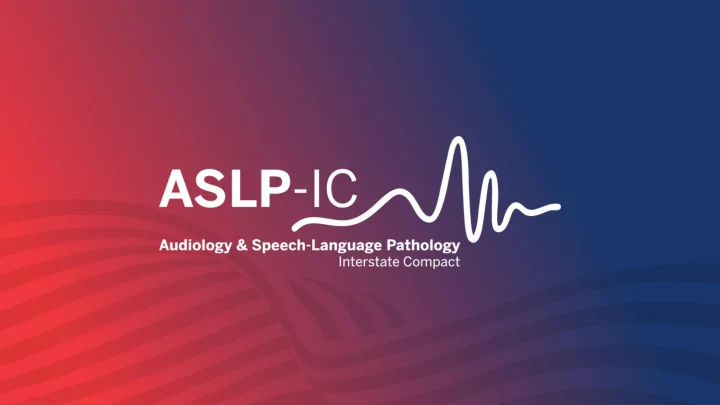

What is the ASLP-IC? ASLP-IC is an occupational licensure compact that: • Addresses increased demand to provide/receive audiology and speech-language pathology services. • Authorizes both telehealth and in-person practice across state lines in ASLP-IC states. • Is similar in form and function to occupational licensure compacts for nursing, psychology, medicine, physical therapy and emergency medical services. • Is operational when 10 states enact the legislation for the compact.
Benefits • Increasing access to client, patient and student care. • Facilitating continuity of care when clients, patients, and students relocate, travel. • Certifying that audiologists and speech-language pathologists have met acceptable standards of practice. • Promoting cooperation between ASLP-IC states in the areas of licensure and regulation. • Offering a higher degree of consumer protection across state lines.
Impacts • Allowing licensed audiologists and speech-language pathologists to practice face to face or through telehealth across state lines without having to become licensed in additional ASLP-IC states. • Permitting audiologists and SLPs to provide services to populations currently underserved or geographically isolated. • Allowing military personnel and spouses to more easily maintain their profession when relocating.
State Participation States must meet the same requirements for licensure to join the compact. • Audiologists – Doctoral degree (Masters before 12/31/07); supervised clinical practicum; passage of national exam • SLPs – Masters degree; supervised clinical practicum; passage of national exam; clinical fellowship • Both – Active unencumbered license; not been convicted or found guilty of felony related to practice; valid Social Security number or NPI number • States must have or adopt an FBI finger-print based criminal background check system.
Compact Privilege • Audiologists and SLPs must be licensed in their home state apply for a privilege to practice under the ASLP-IC. No forum shopping. • The privilege to practice renews at the same time as the home state license. Continuing education is based on your home state license, unless it relates to scope of practice. • States must allow for the practice of telehealth for privilege holders • Active duty military personnel, or their spouse, may designate a home state where the individual has a current license in good standing. The individual may retain the home state designation during the period the service member is on active duty.
How Will it Affect School Based Members? If an ASLP-IC participating state does not require a separate license or certification to work in a school, an individual who works in a school may obtain a privilege to practice under the ASLP-IC. That individual may work in a school in another participating state only if that state does not require a separate license or certification to do so. Home State Requirement Remote State Privilege to Practice? Requirement One License One License Privilege to Practice One License DOE License/Certification DOE License/Certification DOE License/Certification DOE License/Certification DOE License/Certification DOE License/Certification One License Privilege to Practice
How Will it Affect Dispensing Audiologists? If an ASLP-IC participating state does not require a separate license or certification to dispense hearing aids, a dispensing audiologist may obtain a privilege to practice under the ASLP-IC. That individual may dispense hearing aids in another participating state only if that state does not require a separate license to do so. Home State Requirement Remote State Privilege to Practice? Requirement One License One License Privilege to Practice One License HAD License HAD License HAD License HAD License HAD License HAD License One License Privilege to Practice
Adverse Actions • ASLP-IC states communicate and exchange information including verification of licensure and disciplinary sanctions. • The home state may take adverse actions against an audiologist or SLP license. A remote state may take adverse action on an audiologist or SLP privilege to practice within that remote state. • If the home state does take adverse action and audiologist SLP license is terminated and the privilege to practice in all remote states is revoked . • If a privilege to practice is revoked because of an adverse action, every other state where a privilege to practice is held and where the home state license is held will determine if the privilege or license in that state is also revoked.
Compact Commission The Compact Commission is the governing body of ASLP-IC and is responsible for its oversight and the creation of its Rules and Bylaws. • Consist of two voting delegates (one audiologist and one speech-language pathologist) appointed by each compact state who shall serve as that state’s commissioner. The delegates are appointed by each states regulatory Board. • An additional five (5) delegates, who are either a public member or board administrator from a state licensing board, shall be chosen by the Executive Committee from a pool of nominees provided by the Commission at Large. • Each commissioner is granted (1) vote • Executive Committee is made up of seven voting members and 3 non- voting ex-officios.
Data System • A coordinated data system will require that compact states submit a uniform dataset on all ASLP-IC audiologists and SLPs to who the compact applies. • Database will allow for expedited sharing of adverse actions against compact audiologists and SLPs.
Impact on States • The rules of the ASLP-IC are only applicable to states that enact ASLP- IC. • A state can withdraw from ASLP-IC by repealing the ASLP-IC Model Legislation. • ASLP- IC does not impact a state’s right or ability to issue a license.
CONTACT Name | Susan Adams sadams@asha.org | 301-296-5665 Name | Dan Logsdon dlogsdon@csg.org | 859-244-8226
Recommend
More recommend